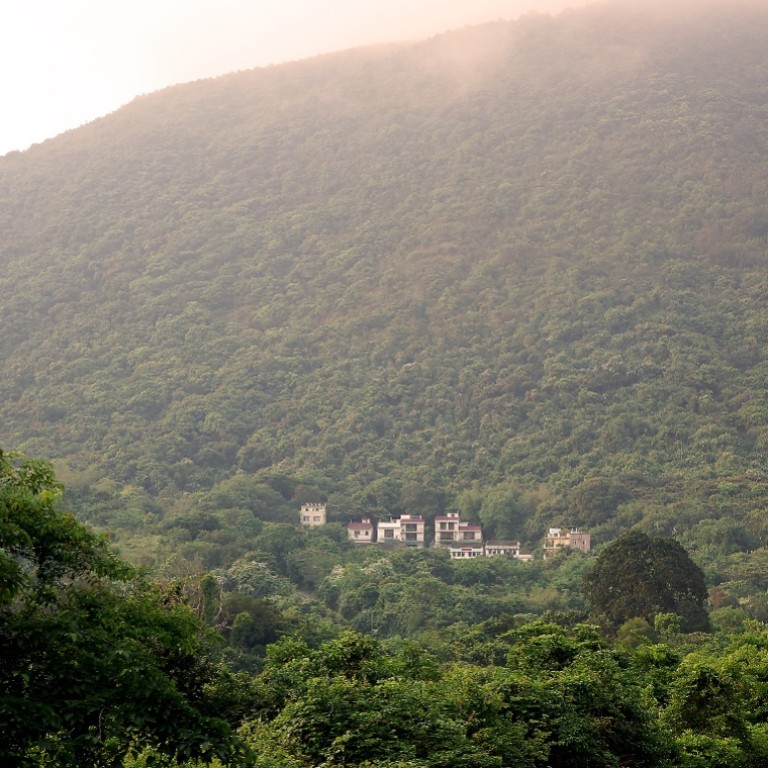
Sai Kung construction project meets fierce opposition as residents allege 'abuse of small-house policy'
Applications to build village houses inside a country park enclave may be 'coordinated' ploy for large-scale development, local residents say
Conservation groups and Sai Kung residents are marshalling against applications to build 26 village houses inside a country park enclave, arguing the collective development is a flagrant abuse of the controversial small-house policy.
More than 27,000 objections were submitted to town planners earlier this month against plans to concrete over once-forested land abutting Uk Tau, a 13-house hamlet on Pak Tam Road near Wong Shek pier.
Opponents say the proposals, filed during April by 26 male indigenous villagers, to each build a three-storey small house, offer no feasibility or environmental impact studies and are likely to pollute soil and water as well as create traffic congestion.
They also believe the cluster of applications may be a "coordinated" ploy for future large-scale development through exploitation of the small-house policy.
"Examination of the evidence raises a strong suspicion that this is a commercial development being masked by using indigenous villagers to make individual applications for houses under the small-house policy," the Friends of Sai Kung community group said in a letter to the Town Planning Board.
The enclave, nestled within Sai Kung West Country Park, is protected by interim controls for three years until a permanent outline zoning plan is drawn up demarcating which areas can be developed and which are to be conserved.
But all the applications lie in areas tentatively zoned as "unspecified" instead of land designated for village development.
"The applications are, without doubt, coordinated and an obvious ploy to start building before the ecological importance of the area has been assessed by the board," the Friends of Hoi Ha concern group, which represents a nearby enclave, said.
The group's secretary, David Newbery, said he was concerned that each house would be dealt with individually rather than as a complex. "It means the board does not have to look at any of the cumulative impacts."
Under the government's small-house policy, which dates back to 1972, indigenous villagers have the right to claim a plot of land in the New Territories to build homes.
To be eligible, applicants must be male, over 18 years old and descended through the male line from people resident in villages that were already recognised back in 1898.
The policy was designed to tackle the housing needs of indigenous villagers, but has been increasingly subject to exploitation. Court cases have documented how holders of small-house rights applied to build houses while, for a fee, signed secret power-of-attorney documents granting developers control over the land. The developers later take over the property formally.
In the case of Uk Tau, there is no proof that such powers of attorney have been signed over, the groups say. There is evidence, though, that the 26 applicants, surnamed either Lai or Fong, are working in tandem with developers, they say.
According to Land Registry documents, two firms - New Faith International Management and Hanton - acquired all the concerned Uk Tau land plots between 2006 and 2008.
These plots were then all sold on the same day - August 21, 2009 - to the 26 villagers in a deal financed by Landspace Finance, whose director Terry Hung Shing-yin is also a director at Hanton, according to company records.
Another Hanton director is Paul Yiu Yuen-on. The duo were in the news in 2009 over a legal dispute with a design consultant that put paid to a beach resort and spa project at Tan Ka Wan in Sai Kung. Yiu was described by the at the time as a former government chief architect whose firm pulled out of the project.
Hanton and Landspace share the same registered address at Lippo Sun Plaza in Tsim Sha Tsui, but neither director was available for comment when a reporter visited their office last week.
A spokeswoman for the planning board confirmed it had received all 26 small-house applications in April and that each would be assessed on individual merit.
She said the board would take into account planning considerations including planning intention, land use compatibility, development scale as well as environmental and traffic impacts.
"The board cannot aid and abet a scheme that has a high chance of being unlawful," said Paul Zimmerman, chief executive of urban planning firm Designing Hong Kong and co-convenor of the Save Our Country Parks alliance.
Lee Wing-tat, chairman of land and housing policy think tank Land Watch and a former legislator, said that with large undeveloped land increasingly scarce across the New Territories, such development strategies were not uncommon.
"Developers know it is much more lucrative to own a large assembly of lots and then build private villas," Lee said. "One house on one lot doesn't really command a good value nowadays."
He said the practice could be kept within the law as long as the total building floor area was not bigger than the one in their application and no public land was used.
"It's an open secret that the small-house policy no longer exists to serve the original purpose of 'addressing the housing needs of indigenous villagers'."



